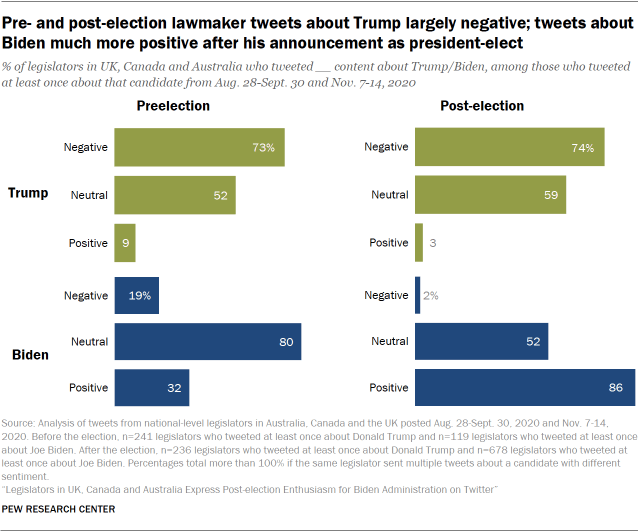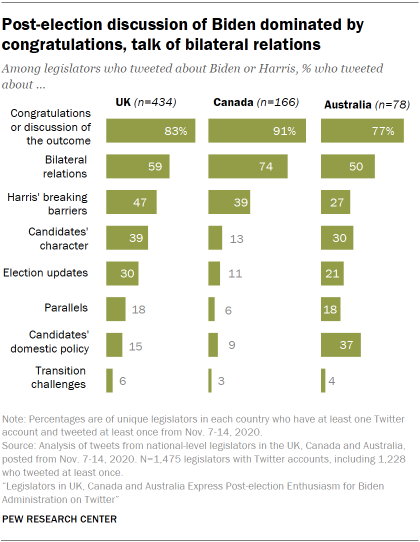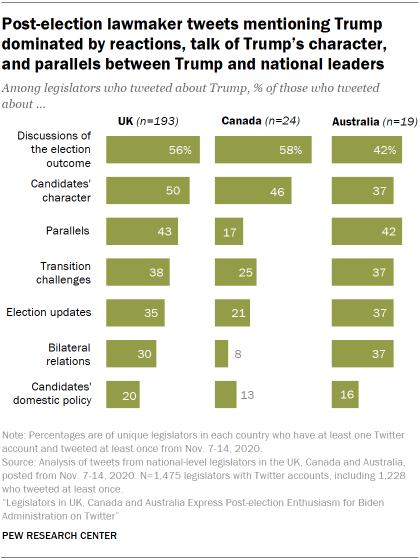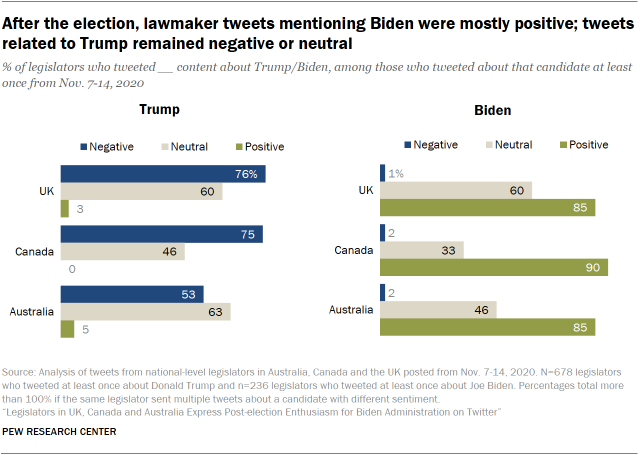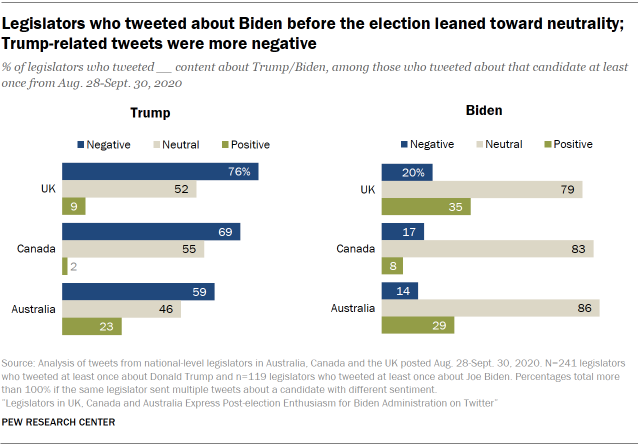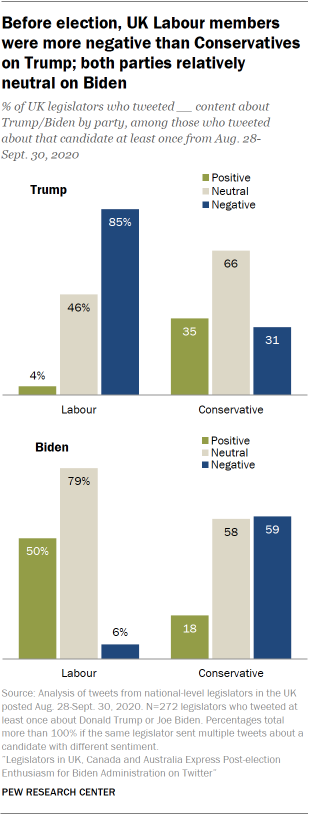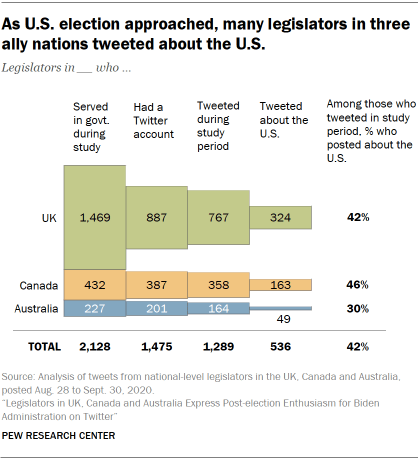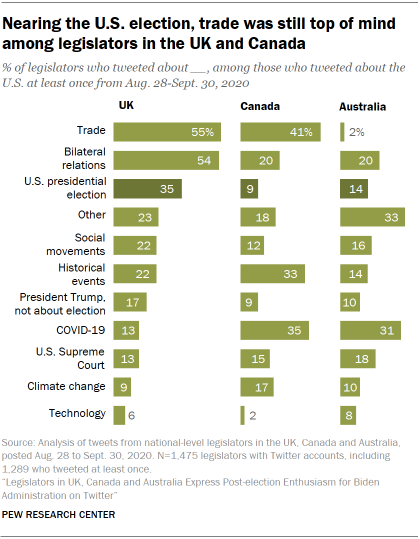Broader discussion of U.S. focuses on how the election and new administration will affect bilateral ties and trade
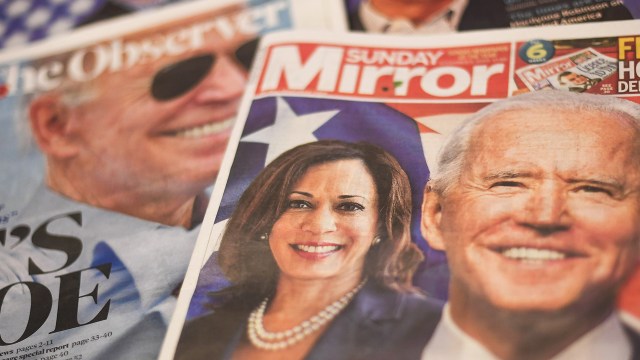
Pew Research Center conducted this analysis to learn more about how officials in three key allied nations have been discussing the 2020 U.S. presidential elections and candidates. This analysis examines 209,862 tweets from 1,310 national-level officials in parliaments in the United Kingdom, Canada and Australia. It excludes heads of government but includes both upper and lower legislative chambers where applicable. The research team collected every tweet posted by these legislators from Aug. 28 to Sept. 30, 2020, and a second batch from Nov. 7 to 14, 2020, using the Twitter API. The data collection period includes the first presidential debate and the release of the “Woodward tapes,” but stops prior to the announcement that President Donald Trump had tested positive for COVID-19. The second batch includes a week of tweets starting from the announcement by the Associated Press and other media organizations that Joe Biden won the election. All tweets were collected prior to rioting at the U.S. Capitol building on Jan. 6, 2021.
Researchers used a series of case-insensitive regular expressions – a pattern of keywords and text formatting – to identify three sets of tweets: tweets about the U.S., tweets that mention President Trump and Vice President Pence, and tweets that reference President-elect Joe Biden and Vice President-elect Kamala Harris. Each of these three sets was analyzed separately. These patterns identified 5,842 tweets as mentioning the U.S., Trump/Pence or Biden/Harris. After accounting for false positives, researchers analyzed 5,637 tweets in the final dataset.
Researchers created legislative rosters by hand, manually identifying all sitting members in each country’s national legislature and then searching for their Twitter accounts. These lists have been continually updated to account for elections, resignations, legislators changing parties and other events. Legislator accounts in the database include official, verified legislator accounts as well as any unofficial accounts that belong to the legislator, such as personal or campaign accounts. See the full methodology for more details.
As President-elect Joe Biden takes office next week, his administration is likely to enact strikingly different policies than his predecessor on a host of issues that will impact the nation’s allies – from climate change and national security to the international response to the coronavirus pandemic and the global economic crisis.
To better understand how elected officials publicly framed the role of the United States and the two major candidates in the run-up to Election Day and after the winner was announced, Pew Research Center collected and analyzed the content of more than 200,000 tweets from legislators in the key American ally nations of Australia, Canada and the United Kingdom from Aug. 28 to Sept. 30 and Nov. 7 to 14, 2020. This analysis does not cover the time period of rioting at the U.S. Capitol building on Jan. 6, 2021.
For the most part, lawmakers in these three nations were hesitant to mention the candidates directly before the election: Just 272 lawmakers in these three countries out of the 1,289 who tweeted during this period (or 21% of the total) made direct reference to either President Donald Trump or former Vice President Joe Biden. But among those legislators who did weigh in, those who tweeted content related to Trump tended to voice negative opinions of the American leader. Some of these critical tweets discussed Trump’s handling of the COVID-19 pandemic – a sentiment shared among the general public in these three nations – or worried that their own country’s leaders would follow his example in governing. Others mentioned the president’s temperament, especially after his performance in the first presidential debate on Sept. 29.
Those who shared tweets about Biden, on the other hand, tended to take a more neutral tone toward the presidential hopeful. These tweets included general statements about Biden’s position on particular issues, direct quotes from the candidate or references to polling results without additional commentary. Positive mentions of Biden included portrayals of him as a preferred foil to Trump, while some negative tweets expressed concern about potential Biden policies or worry that he would extend Obama administration strategies they disagreed with.
In both volume and tone, a different pattern appeared in these legislators’ Twitter activity once Biden was declared the winner by numerous media organizations on Nov. 7. In the week following his victory, more than half of lawmakers who posted at least one tweet mentioned Biden or his running mate Vice President-elect Kamala Harris – and most who did expressed positive sentiment toward the new administration. Many of these legislators sent their congratulations, and several also expressed positive feelings about their nation’s future relations with the U.S. Legislators who tweeted about Trump after the election used a more negative tone, similar to before the election.
When it comes to discussion of the United States more broadly, legislators from these three countries focused their preelection tweets on trade and bilateral relations. In the UK, where the government was continuing plans to officially leave the European Union, legislators often weighed in on trade, such as a potential U.S.-UK trade deal and how Brexit will affect the special relationship between the two nations. Canadian legislators tweeted about trade with the U.S. amid a standoff related to tariffs on Canadian aluminum as well as the pandemic, which resulted in a U.S.-imposed closure of the border in March. Australian legislators most often tweeted about the U.S. through the lens of the coronavirus pandemic and other topics, including comparing their country to the U.S. on policies like publicly funded education. In none of the three countries did the U.S. election itself garner the majority of attention from legislators on Twitter.
These are among the findings of a new Pew Research Center analysis of legislators on Twitter. The Center examined more than 160,000 tweets posted between Aug. 28 and Sept. 30, 2020, and 40,000 tweets posted Nov. 7-14, 2020, by national-level legislators representing Australia, Canada and the United Kingdom.
In the post-election period, tweets about the incoming Biden administration were widespread – and took a largely positive tone
Lawmakers in Australia, Canada and the UK took to Twitter to express their enthusiasm toward a Biden presidency after the Associated Press and other media organizations announced the presidential challenger’s victory on the morning of Nov. 7.
In the week following that announcement, 678 legislators from these three countries tweeted about either Joe Biden or Kamala Harris. That is nearly six times the number of legislators who tweeted about them (119) in the entire month of September, and roughly double the number who tweeted about either set of candidates during that month. Among legislators across these countries who tweeted after the announcement, half or more (ranging from 50% to 59%) mentioned either Biden or Harris.
In contrast, fewer lawmakers (236 in total) mentioned either Donald Trump or Mike Pence in the post-election period – a sharp change from the preelection period, when mentions of the current president were much more common than those of his challenger. The share of active tweeters in each country who mentioned Trump or Pence in the week after the election ranged from 7% (in Canada) to 26% (in the UK).
Across these countries, the largest share of legislators (85%) who mentioned Biden and Harris were reacting to the outcome of the election by offering congratulations, acknowledgments or thoughts on their victory.
Along with these statements, sizable shares of lawmakers in Canada (74%), the UK (59%) and Australia (50%) mentioned the new administration in the context of the various bilateral and multilateral relationships their countries share with the U.S., as well as broader global issues such as the COVID-19 pandemic and climate change.
In the UK, legislators specifically discussed the implications of Biden’s victory to the future of a post-Brexit trade agreement between the two governments in light of the proposed Internal Market Bill. The bill, a version of which was later passed into law by the UK’s Parliament, sought to facilitate trade between the four constituents of the UK, at the risk of violating the terms of the Brexit’s Withdrawal Agreement and the Belfast Agreement.
Legislators also took to Twitter to congratulate Kamala Harris on her achievements in breaking multiple “glass ceilings” and becoming the first woman and person of color to be elected U.S. vice president. Harris was widely cited in these tweets as an inspiration to the next generation of women and people of color with aspirations for public office.
Smaller shares of lawmakers referenced the incoming administration by drawing parallels with politicians or political figures in their home countries, or by referencing domestic policies of the new administration. This latter theme was especially common in Australia, where several lawmakers cited Biden’s $2 trillion pledge for the mitigation of climate change to galvanize the Australian prime minister, Scott Morrison, to take similar actions.
As was the case with Biden, Trump was most often mentioned in the context of lawmakers offering congratulations, acknowledgments or thoughts on the election. However, the overall sentiment of Trump mentions in this topic was much different from those mentioning Biden. Across all three countries, tweets that discussed the outcome of elections mentioned the Biden administration in a positive or neutral way, with very few such tweets expressing negative sentiments. By contrast, it was rare for these tweets to mention Trump or the outgoing administration in a positive light.
These lawmakers also mentioned topics and issues that were less prominent in their discussions of the Biden administration. Some 49% of those who posted Trump-related tweets mentioned the personal character of one or both of the candidates, while a comparable share (40%) referenced parallels between Trump and members of their own country’s leadership. The latter category of tweets was relatively common in the UK, where some lawmakers compared Trump to Prime Minster Boris Johnson.
Lawmakers expressed largely positive sentiment toward incoming Biden administration
Across all three countries, a majority of lawmakers who tweeted after the election expressed positive sentiments when mentioning a prospective Biden administration – ranging from 85% in the UK and Australia to 90% in Canada. Fewer than 2% of legislative tweeters in each country who mentioned the president-elect were negative in tone, with the remainder being neutral or expressing no sentiment one way or the other.
By contrast, fewer than 5% in each country expressed positive sentiment toward Trump. Of the 240 lawmakers who mentioned the incumbent president, just seven expressed a positive sentiment. There were no such references from Canadian lawmakers and just one from a lawmaker in Australia. Meanwhile, the share of tweeters expressing negative sentiment toward the outgoing administration ranged from a low of 53% in Australia to a high of 76% in the UK.
Members of major left-leaning parties in Canada (Liberal), Australia (Labor) and the UK (Labour) were around twice as likely to tweet about Biden and Harris relative to their conservative counterparts. However, in all countries, the vast majority of tweeters – regardless of political affiliation – conveyed positive sentiment toward the incoming president.
Prior to election, legislators abroad tweeted grievances about Trump, muted enthusiasm for a Biden administration
In the days immediately following the 2020 Republican National Convention and through the month of September, legislators in Australia, Canada and the United Kingdom took to Twitter to comment on the two main candidates running in the U.S. presidential election. From Aug. 28 to Sept. 30, more engaged in conversation about the sitting U.S. president than about his opponent: 241 legislators tweeted about Donald Trump, and 119 tweeted about Joe Biden. However, explicit discussion of the two candidates was relatively uncommon. Across these three countries, only small shares of legislators who tweeted during this period mentioned Trump (12%-23%) or Biden (3%-13%) directly.
To the extent that they mentioned the candidates on Twitter, the tone that these legislators took before the general election varied based on which candidate was being discussed. Among the legislators who tweeted about Trump, 73% made negative references to the president. Roughly half (52%) sent out neutral tweets during the same period, and only 9% tweeted positive messages about Trump (these figures total more than 100% because some legislators posted multiple tweets containing different sentiments).
As recent Pew Research Center surveys have found, Trump also received largely negative reviews from the general public in these three countries: Just 23% of Australians, 20% of Canadians and 19% of those in the UK expressed confidence in him. And overall ratings for the U.S. have declined steeply during Trump’s presidency.
The discussion around former Vice President Biden held a more neutral tone. Fully 80% of legislators who tweeted about Biden in late August and September shared impartial (neither explicitly negative nor positive) tweets about the Democratic presidential candidate. Just 19% tweeted negative remarks about Biden – a 54 percentage point difference compared with Trump. And 32% of legislators who mentioned Biden did so in a positive light.
A similar pattern appeared within the three individual countries in the study. More than half of the legislators who tweeted about Trump in each of these three countries shared negative content, while between 46% and 55% tweeted neutral content about the president. And while 23% of Australian legislators who tweeted about Trump wrote something positive before the election, only 9% in the UK and 2% in Canada did the same.
Legislators in each of the three countries voiced negative opinions on Twitter for different reasons, usually related to policy issues that affected their own country. In the UK, for instance, bilateral trade relations motivated legislator tweets. Many there decried Trump’s tariffs on Scotch whisky and critiqued Biden’s comments on how the Belfast Agreement, also known as the Good Friday Agreement, could affect a U.S.-UK trade deal should he become president.
Legislators in all three nations voiced negative opinions of Trump based on his character or personality. In their preelection tweets, many brought up questions of Trump’s integrity related to various news stories that broke in September, including concerns that he publicly downplayed the pandemic, alleged disparaging comments he made about military veterans and contentions that he paid just $750 in federal income taxes the year he won the presidency. Several legislators also tweeted negative remarks regarding Trump’s demeanor in the first presidential debate. Few gave the same sort of critical attention to Biden.
Positive tweets about Trump were much less common and often came from politicians in right-leaning parties. For example, 35% of Conservative legislators in the UK who tweeted about Trump shared positive content, while only 4% of Labour politicians followed suit. Several of these tweets lauded the Trump administration’s brokering of the Abraham Accords, an agreement for the United Arab Emirates and Bahrain to normalize relations with Israel, signed on Sept. 15.
Party differences also arose among those in the UK who tweeted about Biden. Most Labour members who tweeted about the former vice president shared neutral content, and half posted positive messages. Nearly equal numbers of legislators among Conservative members of Parliament tweeted neutral or negative content about Biden, including tweets related to his comments on the Good Friday/Belfast Agreement and Brexit trade negotiations.
Legislative mentions of the U.S. before the election focused more on trade and political relations, less on elections
Beyond direct mentions of the two major candidates for president, discussion of the United States more broadly was much more common. From Aug. 28 to Sept. 30, 2020, 42% of lawmakers in Australia, Canada and the UK who tweeted did so at least once about the U.S. – either through direct mention of the name “United States” or some other variant such as “U.S.” or “America.” These mentions were similarly common among legislators in Canada (46% of legislators who tweeted) and the UK (42%), but less so for those in Australia (30%). However, mentions of the U.S. made up only a small fraction of all social media content from these lawmakers: approximately 1% of all tweets produced by all members of these parliaments in each country during this period.
Legislative tweeters who mentioned the U.S. were more likely to be members of left-leaning parties in their respective countries, such as the Australian Labor Party (40% tweeted at least once in the study period vs. 10% of members from the right-leaning Liberal Party), the Canadian Liberal Party (59% vs. 31% Conservative Party) and the British Labour Party (54% vs. 33% Conservative Party).
Around 25% of legislators in all three countries who mentioned the U.S. in a tweet talked about the upcoming American elections. This topic was most popular among British legislators, with 35% who referenced the U.S. also mentioning the November election. Legislators in other countries discussed the topic to a much lesser extent – 14% in Australia and 9% in Canada. Tweets about the U.S. election mentioned support or opposition for certain candidates, opinions on the first presidential debate or the implications of U.S. election results, among other topics.
Members from left-leaning parties more often tweeted about the upcoming U.S. election compared with their right-leaning counterparts. For example, 39% of Labour MPs in the UK shared election-related content while 26% of Conservative MPs did the same.
Approximately 14% of tweeting legislators in Australia, Canada and the UK who mentioned the U.S. also discussed Donald Trump outside of the scope of the election, ranging from 17% in the UK to 9% in Canada. As highlighted in the previous section of this report, most of these tweets were critical in nature.
Despite Election Day fast approaching, the U.S. elections were not the most popular topic related to mentions of the U.S. among legislators in these three countries. The topic of “trade” held that distinction in the UK and Canada: 55% and 41%, respectively, of the legislators who tweeted and mentioned the U.S. did so through the lens of trade relations and policies. In the UK, speculation about the future of the U.S.-UK trade agreement garnered much attention, especially in response to a recent Brexit deal proposal that could potentially affect the Good Friday Agreement, also called the Belfast Agreement.
Beef was also a particular commodity of interest for legislators in the UK who tweeted about the U.S. Several celebrated the first shipment of UK beef to the U.S. market in more than 20 years, after the 1996 mad cow disease outbreak resulted in a U.S. ban of beef imports from the nation. At the same time, many voiced their support for the continued ban on American shipments of hormone-injected beef to the UK as part of ongoing Brexit trade negotiations with the U.S.
In Canada, legislators lauded the end of tariffs on Canadian aluminum by the U.S. trade representative, the culmination of a month-long trade dispute between the two governments.
Around 40% of the legislators who tweeted about the U.S. ahead of the election talked about bilateral relations or other topics in global affairs, though this ranges from 54% in the UK to 20% in Canada and Australia. Legislators in Australia discussed this topic in connection to the potential extradition of Julian Assange, an Australian national who founded Wikileaks, to the U.S. In the UK, legislators who tweeted about international relations mentioned the U.S.-UK special relationship and the United States’ role as a guarantor of the Good Friday/Belfast Agreement.
Months after the killing of George Floyd and subsequent protests that received legislator attention on Twitter, legislators in all three countries who tweeted continued to talk about issues related to social justice movements at home and in the U.S. This ranges from 12% in Canada to 22% in the UK.
More than one-in-ten legislators in Australia, Canada and the UK who tweeted about the U.S. expressed their condolences on the death of U.S. Supreme Court Justice Ruth Bader Ginsburg on Sept. 18, roughly halfway through the preelection study period. They also weighed in on the subsequent discussions regarding plans for her replacement.
For legislators in Canada, some themes, such as the pandemic (35%), remembering historical events (33%) and environmental issues (17%), uniquely stood out. Legislators tweeted in remembrance of the 19th anniversary of the 9/11 terrorist attacks, lamenting the many Canadian lives lost alongside their American neighbors. The Canada-U.S. border featured in many tweets, especially those regarding COVID-19 and the environment. In mid-September, the U.S. Department of Homeland Security announced an extension to the border closures for nonessential travel to and from Canada. Legislators also worried about the effects of the ongoing wildfires in the western part of the continent.
The majority of legislators in Australia who tweeted about the U.S. before the election (32%) spoke about other topics, mentioning the U.S. mostly as a point of reference or as cautionary tale for the issues happening domestically. About one-in-five also mentioned the U.S. in regard to bilateral relations or the U.S. Supreme Court.


